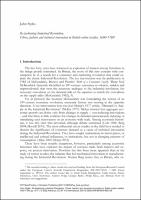Chapter Re-fashioning Industrial Revolution. Fibres, fashion and technical innovation in British cotton textiles, 1600-1780
| dc.contributor.author | Styles, John | |
| dc.date.accessioned | 2022-06-01T12:29:42Z | |
| dc.date.available | 2022-06-01T12:29:42Z | |
| dc.date.issued | 2022 | |
| dc.identifier | ONIX_20220601_9788855185653_794 | |
| dc.identifier.uri | https://library.oapen.org/handle/20.500.12657/56610 | |
| dc.description.abstract | The early years of the British Industrial Revolution were dominated by mechanical innovations in cotton spinning. They emerged at a time when raw cotton prices were unprecedentedly high and the supply of all-cotton fabrics from India, the world’s principal producer of cotton textiles, had contracted dramatically. Most «cotton» textiles manufactured in Britain in the mid-18th century were combinations of expensive cotton yarn and cheap linen yarn. Faced with rising material costs, manufacturers economised by increasing the proportion of cheaper linen yarn. The most fashionable cotton products were, however, made entirely from cotton, or required a fixed proportion of cotton yarn. As the cost of cotton rose, their rapidly rising sales provided the principal inducement to improve quality and cut costs by inventing machines for spinning cotton yarn. | |
| dc.language | English | |
| dc.relation.ispartofseries | Datini Studies in Economic History | |
| dc.subject.other | Cotton | |
| dc.subject.other | fashion | |
| dc.subject.other | fibres | |
| dc.subject.other | yarns | |
| dc.subject.other | industrial revolution. | |
| dc.title | Chapter Re-fashioning Industrial Revolution. Fibres, fashion and technical innovation in British cotton textiles, 1600-1780 | |
| dc.type | chapter | |
| oapen.identifier.doi | 10.36253/978-88-5518-565-3.06 | |
| oapen.relation.isPublishedBy | bf65d21a-78e5-4ba2-983a-dbfa90962870 | |
| oapen.relation.isbn | 9788855185653 | |
| oapen.series.number | 2 | |
| oapen.pages | 27 | |
| oapen.place.publication | Florence |

